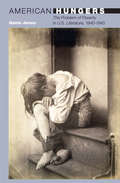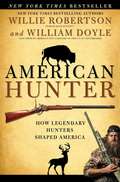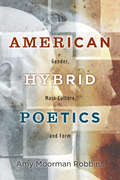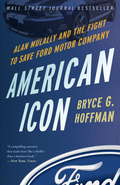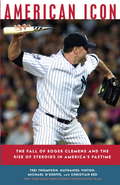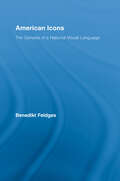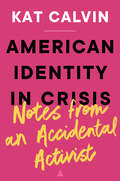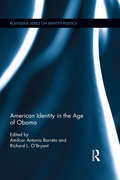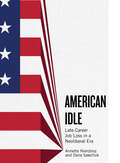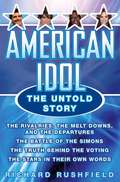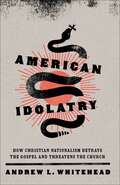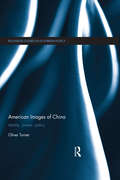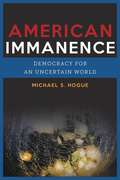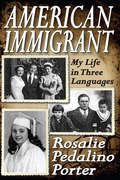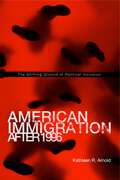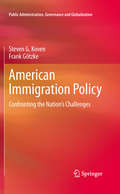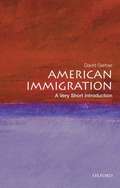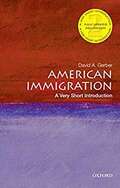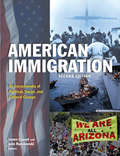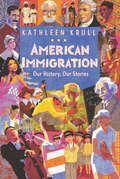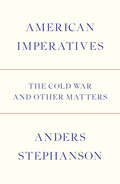- Table View
- List View
American Hungers: The Problem of Poverty in U.S. Literature, 1840-1945 (20/21 #9)
by Gavin JonesSocial anxiety about poverty surfaces with startling frequency in American literature. Yet, as Gavin Jones argues, poverty has been denied its due as a critical and ideological framework in its own right, despite recent interest in representations of the lower classes and the marginalized. These insights lay the groundwork for American Hungers, in which Jones uncovers a complex and controversial discourse on the poor that stretches from the antebellum era through the Depression. Reading writers such as Herman Melville, Theodore Dreiser, Edith Wharton, James Agee, and Richard Wright in their historical contexts, Jones explores why they succeeded where literary critics have fallen short. These authors acknowledged a poverty that was as aesthetically and culturally significant as it was socially and materially real. They confronted the ideological dilemmas of approaching poverty while giving language to the marginalized poor--the beggars, tramps, sharecroppers, and factory workers who form a persistent segment of American society. Far from peripheral, poverty emerges at the center of national debates about social justice, citizenship, and minority identity. And literature becomes a crucial tool to understand an economic and cultural condition that is at once urgent and elusive because it cuts across the categories of race, gender, and class by which we conventionally understand social difference. Combining social theory with literary analysis, American Hungers masterfully brings poverty into the mainstream critical idiom.
American Hunter
by William Doyle Willie RobertsonNew York Times bestselling author and star of A&E's Duck Dynasty, Willie Robertson, teams up with William Doyle, the bestselling co-author of American Gun, to share the history of America's most well known hunters.American Hunter is the first book ever to compile a chronological history of America's greatest hunters. Based on the powerful personalities of colorful men and women, this book begins with the Plains Indians and moves through legendary hunters like Daniel Boone, Davy Crockett, Kit Carson, Buffalo Bill, Teddy Roosevelt, Ernest Hemingway, Lyndon Johnson, and more. Also included are the histories of American fox, rabbit, deer, squirrel, duck, goose, and big-game hunting, as well as action biographies of classic hunting weapons. Author Willie Robertson, famed hunter of Duck Dynasty and Duck Commander, lends his voice to share this bodacious collection of true stories that you'll want to tell around the campfire after a long day's hunt. As Teddy Roosevelt put it, "The virility, clear-sighted common sense and resourcefulness of the American people is due to the fact that we have been a nation of hunters and frequenters of the forest, plains, and waters." It's about time we honor American hunters with a book that tells their incredible stories of skill, courage, survival, and downright bodaciousness. American Hunter is the perfect book for everyone who enjoys amazing tales of American history and for those who love hunting, sport shooting, and wide open spaces.
American Hybrid Poetics: Gender, Mass Culture, and Form
by Amy Moorman RobbinsAmerican Hybrid Poetics explores the ways in which hybrid poetics--a playful mixing of disparate formal and aesthetic strategies--have been the driving force in the work of a historically and culturally diverse group of women poets who are part of a robust tradition in contesting the dominant cultural order. Amy Moorman Robbins examines the ways in which five poets--Gertrude Stein, Laura Mullen, Alice Notley, Harryette Mullen, and Claudia Rankine--use hybridity as an implicitly political strategy to interrupt mainstream American language, literary genres, and visual culture, and expose the ways in which mass culture in the twentieth and twenty-first centuries has had a powerfully standardizing impact on the collective American imagination. By forcing encounters between incompatible traditions--consumer culture with the avant-garde, low culture forms with experimental poetics, prose poetry with linguistic subversiveness--these poets bring together radically competing ideologies and highlight their implications for lived experience. Robbins argues that it is precisely because these poets have mixed forms that their work has gone largely unnoticed by leading members and critics in experimental poetry circles.
American Icon: Alan Mulally and the Fight to Save Ford Motor Company
by Bryce G. HoffmanTHE INSIDE STORY OF THE EPIC TURNAROUND OF FORD MOTOR COMPANY UNDER THE LEADERSHIP OF CEO ALAN MULALLY. At the end of 2008, Ford Motor Company was just months away from running out of cash. With the auto industry careening toward ruin, Congress offered all three Detroit automakers a bailout. General Motors and Chrysler grabbed the taxpayer lifeline, but Ford decided to save itself. Under the leadership of charismatic CEO Alan Mulally, Ford had already put together a bold plan to unify its divided global operations, transform its lackluster product lineup, and overcome a dysfunctional culture of infighting, backstabbing, and excuses. It was an extraordinary risk, but it was the only way the Ford family--America's last great industrial dynasty--could hold on to their company. Mulally and his team pulled off one of the greatest comebacks in business history. As the rest of Detroit collapsed, Ford went from the brink of bankruptcy to being the most profitable automaker in the world. American Icon is the compelling, behind-the-scenes account of that epic turnaround. On the verge of collapse, Ford went outside the auto industry and recruited Mulally--the man who had already saved Boeing from the deathblow of 9/11--to lead a sweeping restructuring of a company that had been unable to overcome decades of mismanagement and denial. Mulally applied the principles he developed at Boeing to streamline Ford's inefficient operations, force its fractious executives to work together as a team, and spark a product renaissance in Dearborn. He also convinced the United Auto Workers to join his fight for the soul of American manufacturing. Bryce Hoffman reveals the untold story of the covert meetings with UAW leaders that led to a game-changing contract, Bill Ford's battle to hold the Ford family together when many were ready to cash in their stock and write off the company, and the secret alliance with Toyota and Honda that helped prop up the American automotive supply base. In one of the great management narratives of our time, Hoffman puts the reader inside the boardroom as Mulally uses his celebrated Business Plan Review meetings to drive change and force Ford to deal with the painful realities of the American auto industry. Hoffman was granted unprecedented access to Ford's top executives and top-secret company documents. He spent countless hours with Alan Mulally, Bill Ford, the Ford family, former executives, labor leaders, and company directors. In the bestselling tradition of Too Big to Fail and The Big Short, American Icon is narrative nonfiction at its vivid and colorful best.
American Icon: The Fall of Roger Clemens and the Rise of Steroids in America's Pastime
by Teri Thompson Nathaniel Vinton Michael O'Keeffe Christian RedIt was an epic downfall. In twenty-four seasons pitcher Roger Clemens put together one of the greatest careers baseball has ever seen. Seven Cy Young Awards, two World Series championships, and 354 victories made him a lock for the Hall of Fame. But on December 13, 2007, the Mitchell Report laid waste to all that. Accusations that Clemens relied on steroids and human growth hormone provided and administered by his former trainer, Brian McNamee, have put Clemens in the crosshairs of a Justice Department investigation. Why did this happen? How did it happen? Who made the decisions that altered some lives and ruined others? How did a devastating culture of drugs, lies, sex, and cheating fester and grow throughout Major League Baseball's clubhouses? The answers are in these extraordinary pages. American Icon: The Fall of Roger Clemens and the Rise of Steroids in America's Pastime is about much more than the downfall of a superstar. While the fascinating portrait of Clemens is certainly at the center of the action, the book takes us outside the white lines and inside the lives and dealings of sports executives, trainers, congressmen, lawyers, drug dealers, groupies, a porn star, and even a murderer-- all of whom have ties to this saga. Four superb investigative journalists have spent years uncovering the truth, and at the heart of their investigation is a behind-the-scenes portrait of the maneuvering and strategies in the legal war between Clemens and his accuser, McNamee. This compelling story is the strongest examination yet of the rise of illegal drugs in America's favorite sport, the gym-rat culture in Texas that has played such an important role in spreading those drugs, and the way Congress has dealt with the entire issue. Andy Pettitte, Jose Canseco, Alex Rodriguez, and Chuck Knoblauch are just a few of the other players whose moving and sometimes disturbing stories are illuminated here as well. The New York Daily News Sports Investigative Team has written the definitive book on corruption and the steroids era in Major League Baseball. In doing so, they have managed to dig beneath the disillusion and disappointment to give us a stirring look at heroes who all too often live unheroic shadow lives.
American Icons: The Genesis of a National Visual Language (Routledge Research in Cultural and Media Studies)
by Benedikt FeldgesDespite the work that has been done on the power of visual communication in general, and about the social influence of television in particular, television’s relationship with reality is still something of a black box. Even today, the convention that the screen functions as a window on reality structures much of the production and reception of televisual narratives. But as reality ought to become history at one point, what are we to do with such windows on the past? Developing and applying a highly innovative approach to the modern picture, American Icons sets out to expose the historicity of icons, to reframe the history of the screen and to dissect the visual core of a medium that is still so poorly understood. Dismantling the aura of apparently timeless icons and past spectacles with their seductive power to attract the eye, this book offers new ways of seeing the mechanisms at work in our modern pictorial culture.
American Identity and the Politics of Multiculturalism
by David O. Sears Jack CitrinThe civil rights movement and immigration reform transformed American politics in the mid-1960s. Demographic diversity and identity politics raised the challenge of e pluribus unum anew, and multiculturalism emerged as a new ideological response to this dilemma. This book uses national public opinion data and public opinion data from Los Angeles to compare ethnic differences in patriotism and ethnic identity and ethnic differences in support for multicultural norms and group-conscious policies. The authors find evidence of strong patriotism among all groups and the classic pattern of assimilation among the new wave of immigrants. They argue that there is a consensus in rejecting harder forms of multiculturalism that insist on group rights but also a widespread acceptance of softer forms that are tolerant of cultural differences and do not challenge norms, such as by insisting on the primacy of English.
American Identity in Crisis: Notes from an Accidental Activist
by Kat CalvinA trailblazing activist’s passionate and incisive look at why she started a movement to ensure that 26 million Americans have access to the IDs they need to escape poverty and live healthy and productive livesAmerican Identity in Crisis weaves together three remarkable stories: the making of an activist in the wake of the 2016 presidential election; the fight against the onerous rules that are being used to keep vulnerable and targeted populations from participating in all facets of American life -from obtaining jobs and housing to going to the polls- and how we can solve a problem that impacts millions of American adults.Kat Calvin ties all of these threads together in profound ways. In American Identity in Crisis, she takes us on a cross-country tour as she and her team uncover one of the biggest secrets in America and learn how to solve it. We meet veterans, the unhoused, and senior citizens, and learn the story of the fierce advocate who insists on recognizing their humanity and seeing them as souls who are resilient and striving for change. Told in a voice that is strong and vulnerable; funny and fearless, confident and self-deprecating, American Identity in Crisis is a defense of human dignity and everyone’s right to have access to the pursuit of happiness.
American Identity in the Age of Obama (Routledge Series on Identity Politics)
by Amílcar Antonio Barreto Richard L. O’BryantThe election of Barack Obama as the 44th president of the United States has opened a new chapter in the country’s long and often tortured history of inter-racial and inter-ethnic relations. Many relished in the inauguration of the country’s first African American president — an event foreseen by another White House aspirant, Senator Robert Kennedy, four decades earlier. What could have only been categorized as a dream in the wake of Brown vs. Board of Education was now a reality. Some dared to contemplate a post-racial America. Still, soon after Obama’s election a small but persistent faction questioned his eligibility to hold office; they insisted that Obama was foreign-born. Following the Civil Rights battles of the 20th century hate speech, at least in public, is no longer as free flowing as it had been. Perhaps xenophobia, in a land of immigrants, is the new rhetorical device to assail what which is non-white and hence un-American. Furthermore, recent debates about immigration and racial profiling in Arizona along with the battle over rewriting of history and civics textbooks in Texas suggest that a post-racial America is a long way off. What roles do race, ethnicity, ancestry, immigration status, locus of birth play in the public and private conversations that defy and reinforce existing conceptions of what it means to be American? This book exposes the changing and persistent notions of American identity in the age of Obama. Amílcar Antonio Barreto, Richard L. O’Bryant, and an outstanding line up of contributors examine Obama’s election and reelection as watershed phenomena that will be exploited by the president’s supporters and detractors to engage in different forms of narrating the American national saga. Despite the potential for major changes in rhetorical mythmaking, they question whether American society has changed substantively.
American Idle: Late-Career Job Loss in a Neoliberal Era (Inequality at Work: Perspectives on Race, Gender, Class, and Labor)
by Annette Nierobisz Dana Sawchuk Dana Sawchuck Annette Marie NierobiszIn American Idle, sociologists Annette Nierobisz and Dana Sawchuk report their findings from interviews with sixty-two mostly white-collar workers who experienced late-career job loss in the wake of the Great Recession. Without the benefits of planned retirement or time horizons favorable to recouping their losses, these employees experience an array of outcomes, from hard falls to soft landings. Notably, the authors find that when reflecting on the effects of job loss, fruitless job searches, and the overall experience of unemployment, participants regularly called on the frameworks instilled by neoliberalism. Invoking neoliberal rhetoric, these older Americans deferred to businesses’ need to prioritize bottom lines, accepted the shift toward precarious employment, or highlighted the importance of taking initiative and maintaining a positive mindset in the face of structural obstacles. Even so, participants also recognized the incompatibility between neoliberalism’s “one-size-fits-all” solutions and their own situations; this disconnect led them to consider their experiences through competing frameworks and to voice resistance to aspects of neoliberal capitalism. Employing a life course sociology perspective to explore older workers’ precarity in an age of rising economic insecurity, Nierobisz and Sawchuk shed light on a new wrinkle in American aging.
American Idol: The Untold Story
by Richard RushfieldThe currency is fame, and it's bigger than money, more desired than power. Each season American Idol delivers on a promise whose epic scope is unparalleled in the annals of competition: to take an unknown dreamer from the middle of America and turn him or her into a genuine star. It has become not only the biggest show on television, but the biggest force in all of entertainment; its alumni dominate the recording charts and Broadway, win Academy Awards, and sweep up Grammys. In fact, American Idol has reshaped the very idea of celebrity. But it didn't start out that way. When the little singing contest debuted as a summer replacement on the U.S. airwaves, it was packed between reruns and low-cost filler. The promise that it would find America's next pop star produced a hearty round of guffaws from the country's media critics. Now, some ten years and millions of records later, no one is laughing. American Idol: The Untold Story chronicles the triumphs and travails, the harrowing backstage drama and the nail-biting onstage battles that built this revolutionary show. In this revealing book, veteran journalist Richard Rushfield goes deeper inside the circus than any reporter ever has. Candid interviews with Idol alumni, including Simon Fuller and Simon Cowell, shed new light on the show that changed the entertainment industry. And because Rushfield had full access to the people who created the show, starred in it, and kept it atop the pop culture pyramid, this book is the first to take Americans behind the curtain and tell what has really been happening on the world's most watched and speculated-about stage.
American Idolatry: How Christian Nationalism Betrays The Gospel And Threatens The Church
by Andrew L. WhiteheadAn expert on Christian nationalism identifies three areas—power, fear, and violence—where nationalism conflicts with core gospel beliefs and reveals its theological and spiritual costs in the church before pointing a way forward.
American Images of China: Identity, Power, Policy (Routledge Studies in US Foreign Policy)
by Oliver TurnerThe United States and China are arguably the most globally consequential actors of the early twenty first century, and look set to remain so into the foreseeable future. This volume seeks to highlight that American images of China are responsible for constructing certain truths and realities about that country and its people. It also introduces the understanding that these images have always been inextricable from the enactment and justification of US China policies in Washington, and that those policies themselves are active in the production and reproduction of imagery and in the protection of American identity when seemingly threatened by that of China. Demonstrating how past American images of China are vital to understanding the nature and significance of those which circulate today, Turner addresses three key questions: What have been the dominant American images of China and the Chinese across the full lifespan of Sino-US relations? How have historical and contemporary American images of China and the Chinese enabled and justified US China policy? What role does US China policy play in the production and reproduction of American images of China? Exploring and evaluating a wide-ranging variety of sources including films and television programmes, newspaper and magazine articles, the records and journals of politicians and diplomats and governmental documents including speeches and legal declarations this work will be of great interest to students and scholars of US foreign policy, American politics, China studies and international relations.
American Immanence: Democracy for an Uncertain World (Insurrections: Critical Studies in Religion, Politics, and Culture)
by Michael S. HogueThe Anthropocene marks the age of significant human impact on the Earth’s ecosystems, dramatically underscoring the reality that human life is not separate from nature but an integral part of it. Culturally, ecologically, and socially destructive practices such as resource extraction have led to this moment of peril. These practices, however, implicate more than industrial and economic systems: they are built into the political theology of American exceptionalism, compelling us to reimagine human social and political life on Earth. American Immanence seeks to replace the dominant American political tradition, which has resulted in global social, economic, and environmental injustices, with a new form of political theology, its dominant feature a radical democratic politics. Michael S. Hogue explores the potential of a dissenting immanental tradition in American religion based on philosophical traditions of naturalism, process thought, and pragmatism. By integrating systems theory and concepts of vulnerability and resilience into the lineages of American immanence, he articulates a political theology committed to democracy as an emancipatory and equitable way of life. Rather than seeking to redeem or be redeemed, Hogue argues that the vulnerability of life in the Anthropocene calls us to build radically democratic communities of responsibility, resistance, and resilience. American Immanence integrates an immanental theology of, by, and for the planet with a radical democratic politics of, by, and for the people.
American Immigrant: My Life in Three Languages
by Rosalie PorterImmigration is one of the most contentious issues in twenty-first-century America. In forty years, the American population has doubled from 150 to 300 million, about half of the increase due to immigration. Discussions involving legal and illegal status, assimilation or separatism, and language unity or multilingualism continue to spark debate. The battle to give five million immigrant children America's common language, English, and to help these students join their English-speaking classmates in opportunities for self-fulfillment continues to be argued. American Immigrant is part memoir and part account of Rosalie Pedalino Porter's professional activities as a national authority on immigrant education and bilingualism.Her career began in the 1970s, when she entered the most controversial arena in public education, bilingualism. This book chronicles the political movement Porter helped lead, one that succeeded in changing state laws in California, Arizona, and Massachusetts. Programs that had segregated Latino children by language and ethnicity for years, diminishing their educational opportunities, were removed with overwhelming public support. New English-language programs in these states are reporting improved academic achievement for these students.This book is also Porter's testament to the boundless opportunities for women in the United States, and to the unique blending of ethnicities and religions and races into harmonious families, her own included, that continues to be a true strength of the United States Porter examines women's roles, beginning in the 1940s and continuing through the millennium, from the vantage point of someone who grew up in a working-class, male-dominated family. She explores the emotional price exacted by dislocation from one's native land and traditions; traveling and living in the Middle East, Europe, and Asia; and the evolving character of marriage and family in twenty-first-century America.
American Immigration After 1996: The Shifting Ground of Political Inclusion
by Kathleen R. ArnoldFew topics generate as much heated public debate in the United States today as immigration across our southern border. Two positions have been staked out, one favoring the expansion of guest-worker programs and focusing on the economic benefits of immigration, and the other proposing greater physical and other barriers to entry and focusing more on the perceived threat to national security from immigration. Both sides of this debate, however, rely in their arguments on preconceived notions and unexamined assumptions about assimilation, national identity, economic participation, legality, political loyalty, and gender roles. In American Immigration After 1996, Kathleen Arnold aims to reveal more of the underlying complexities of immigration and, in particular, to cast light on the relationship between globalization of the economy and issues of political sovereignty, especially what she calls “prerogative power” as it is exercised by the U.S. government.
American Immigration After 1996: The Shifting Ground of Political Inclusion (G - Reference, Information and Interdisciplinary Subjects)
by Kathleen R. ArnoldFew topics generate as much heated public debate in the United States today as immigration across our southern border. Two positions have been staked out, one favoring the expansion of guest-worker programs and focusing on the economic benefits of immigration, and the other proposing greater physical and other barriers to entry and focusing more on the perceived threat to national security from immigration. Both sides of this debate, however, rely in their arguments on preconceived notions and unexamined assumptions about assimilation, national identity, economic participation, legality, political loyalty, and gender roles. In American Immigration After 1996, Kathleen Arnold aims to reveal more of the underlying complexities of immigration and, in particular, to cast light on the relationship between globalization of the economy and issues of political sovereignty, especially what she calls “prerogative power” as it is exercised by the U.S. government.
American Immigration Policy: Confronting the Nation's Challenges (Public Administration, Governance and Globalization #1)
by Steven G. Koven Frank GötzkeThe mission of this book is to counter the apocalyptic vision of the American "invasion" with a more balanced account of the consequences of immigration. The book will examine how the United States has dealt with immigration through enactment of various public policies over time. It will approach the issue from a political, economic and cultural perspective with an emphasis on the qualitative, positive contributions of immigrants. The goal of the book is to provide some individual depth to the larger discussion of immigration that typically is carried out at the "macro" level. It argues that immigration policy is cyclical, ranging from very open to very closed borders. Moreover, it asserts that it is difficult to measure the heterogeneous contributions of immigrants and therefore cost-benefit type assessments of immigration are limited. Case studies of how individual immigrants contribute to culture, politics or economic development of the United States offset empirical studies. The book will review previous immigration policy, data related to economic costs of immigration, literature relevant to the question of the dilution or preservation of "American culture", and immigration policies of other Western nations. The book will look at alternative perspectives on integration including an Americanization, Anglo-conformity perspective, a new American, melting pot perspective, and the cultural pluralism perspective. These perspectives in turn influence the degree to which specific options such as guest workers, amnesty, specialized skill, family unification, border enforcement, employer sanctions or political asylum are prioritized. The combination of rigorous data analysis and engaging, qualitative narrative make this book's contribution to the debate on immigration policy in the United States unique.
American Immigration Today: Pressures, Problems, Policies
by Judith BentleyDiscusses patterns of immigration into the United States and the ethical, political, and economic issues related to American immigration laws and policies.
American Immigration: A Very Short Introduction
by David GerberAmericans have come from every corner of the globe, and they have been brought together by a variety of historical processes--conquest, colonialism, the slave trade, territorial acquisition, and voluntary immigration. A thoughtful look at immigration, anti-immigration sentiments, and the motivations and experiences of the migrants themselves, this book offers a compact but wide-ranging look at one of America's persistent hot-button issues. Historian David Gerber begins by examining the many legal efforts to curb immigration and to define who is and is not an American, ranging from the Naturalization Law of 1795 (which applied only to "free-born white persons") to the Chinese Exclusion Act of 1882, the Emergency Quota Act of 1921, and the reform-minded Immigration and Nationality Act of 1965, which opened the door to millions of newcomers, the vast majority from Asia and Latin America. The book also looks at immigration from the perspective of the migrant--farmers and industrial workers, mechanics and domestics, highly trained professionals and small-business owners--who willingly pulled up stakes for the promise of a better life. Throughout, the book sheds light on the relationships between race and ethnicity in the life of these groups and in the formation of American society, and it stresses the marked continuities across waves of immigration and across different racial and ethnic groups. A fascinating and even-handed historical account, this book puts into perspective the longer history of calls for stronger immigration laws and the on-going debates over the place of immigrants in American society. About the Series: Combining authority with wit, accessibility, and style, Very Short Introductions offer an introduction to some of life's most interesting topics. Written by experts for the newcomer, they demonstrate the finest contemporary thinking about the central problems and issues in hundreds of key topics, from philosophy to Freud, quantum theory to Islam.
American Immigration: A Very Short Introduction (Very Short Introductions)
by David A. GerberAmericans have come from every corner of the globe, and they have been brought together by a variety of historical processes--conquest, colonialism, the slave trade, territorial acquisition, and voluntary immigration. In this Very Short Introduction, historian David A. Gerber captures the histories of dozens of American ethnic groups over more than two centuries and reveals how American life has been formed in significant ways by immigration. He discusses the relationships between race and ethnicity in the life of these groups and in the formation of American society, as well as explaining how immigration policy and legislation have helped to form those relationships. Moreover, by highlighting the parallels that contemporary patterns of immigration and resettlement share with those of the past - which Americans now generally regard as having had positive outcomes - the book offers an optimistic portrait of current immigration that is at odds with much present-day opinion. Newly updated, this book speaks directly to the ongoing fears of immigration that have fueled the debate about both illegal immigration and the need for stronger immigration laws and a border wall.
American Immigration: An Encyclopedia of Political, Social, and Cultural Change
by James Ciment John RadzilowskiThoroughly revised and expanded, this is the definitive reference on American immigration from both historic and contemporary perspectives. It traces the scope and sweep of U.S. immigration from the earliest settlements to the present, providing a comprehensive, multidisciplinary approach to all aspects of this critically important subject.Every major immigrant group and every era in U.S. history are fully documented and examined through detailed analysis of social, legal, political, economic, and demographic factors. Hot-topic issues and controversies - from Amnesty to the U.S.-Mexican Border - are covered in-depth. Archival and contemporary photographs and illustrations further illuminate the information provided. And dozens of charts and tables provide valuable statistics and comparative data, both historic and current. A special feature of this edition is the inclusion of more than 80 full-text primary documents from 1787 to 2013 - laws and treaties, referenda, Supreme Court cases, historical articles, and letters.
American Immigration: Our History, Our Stories
by Kathleen KrullAward-winning author Kathleen Krull takes an in-depth historical look at immigration in America—with remarkable stories of some of the immigrants who helped build this country. With its rich historical text, fascinating sidebars about many immigrants throughout time, an extensive source list and timeline, as well as captivating photos, American Immigration will become a go-to resource for every child, teacher, and librarian discussing the complex history of immigration.America is a nation of immigrants. People have come to the United States from around the world seeking a better life and more opportunities, and our country would not be what it is today without their contributions. From writers like Chimamanda Ngozi Adichie, to scientists like Albert Einstein, to innovators like Elon Musk, this book honors the immigrants who have changed the way we think, eat, and live. Their stories serve as powerful reminders of the progress we’ve made, and the work that is still left to be done.
American Imperatives: The Cold War Reconsidered
by Anders StephansonA radical reinterpretation of the Cold War by its most iconoclastic historian.What was the cold war? Conventional wisdom makes it coextensive with an epoch stretching from the end of the Second World War to the collapse of the Soviet Union, a geopolitical period dominated by the confrontation between the United States and the USSR. In a fundamental challenge to prevailing orthodoxy, Anders Stephanson explodes this misconception, which has misled historians and obscured the US-centered nature of the entire process. He argues that &“the cold war&” is better understood as the frame that made the global role of the US after 1947 not only possible but imperative, and that in its classic form it ended in 1963, after the Cuban Missile Crisis.American Imperatives does not assume that the causes of the great superpower rivalry rest solely with the United States. But the frame was unmistakably and ineradicably American. Without it, there would not have been, properly speaking, a cold war.
American Imperial Pastoral: The Architecture of US Colonialism in the Philippines
by Rebecca Tinio MckennaIn 1904, renowned architect Daniel Burnham, the Progressive Era urban planner who famously “Made No Little Plans,” set off for the Philippines, the new US colonial acquisition. Charged with designing environments for the occupation government, Burnham set out to convey the ambitions and the dominance of the regime, drawing on neo-classical formalism for the Pacific colony. The spaces he created, most notably in the summer capital of Baguio, gave physical form to American rule and its contradictions. In American Imperial Pastoral, Rebecca Tinio McKenna examines the design, construction, and use of Baguio, making visible the physical shape, labor, and sustaining practices of the US’s new empire—especially the dispossessions that underwrote market expansion. In the process, she demonstrates how colonialists conducted market-making through state-building and vice-versa. Where much has been made of the racial dynamics of US colonialism in the region, McKenna emphasizes capitalist practices and design ideals—giving us a fresh and nuanced understanding of the American occupation of the Philippines.
